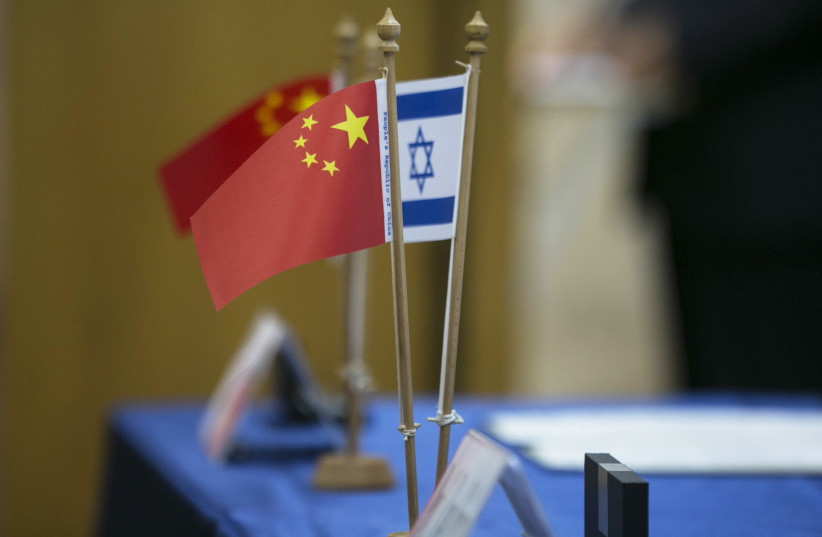Chinese amb. to ‘Post’: Israel-China tech collaboration benefits all humanity
China and Israel share a deep foundation for friendship, having achieved substantial results in friendly exchanges and cooperation across various fields. In March 2017, the two countries established the Innovative Comprehensive Partnership, which has fostered mutual advancement in the realm of scientific and technological innovation, continuously benefiting the peoples of both countries.
Before I took up my post in Israel, I visited Changzhou Innovation Park and Shanghai Innovation Park, both jointly built by China and Israel, and experienced first-hand the strong momentum of China-Israel innovation cooperation. This year marks the 10th anniversary of the establishment of Changzhou Innovation Park.
With nearly 300 Israeli enterprises and China-Israel joint ventures and about 60 projects of bilateral technological cooperation, Changzhou Innovation Park will continue to provide more comprehensive and in-depth support and services for Israeli companies in China.
Shanghai Innovation Park has developed into an innovation cluster of 208 enterprises from China and Israel in a variety of sectors, with 867 intellectual property rights of various types put into use, forming an industrial cluster of medical health, artificial intelligence (AI), Internet, and information technology.
With the support and impetus of intergovernmental projects, people-to-people technological innovation cooperation between China and Israel has flourished. Chinese enterprises have established R&D centers and incubators in Israel, while Israeli hi-tech companies have successively set up operations in China. Close collaboration has also been forged in the fields of clean energy, seawater desalination, and biomedicine.

China’s new energy vehicles, equipped with intelligent driving systems developed by Israeli companies, have been warmly received in global markets. Meanwhile, Israel’s drip irrigation technology has been introduced to China, significantly enhancing the quality and yield of crops, such as potatoes in Inner Mongolia and blueberries in Yunnan. Such examples are too numerous to mention individually.
China and Israel deepen innovation ties
China-Israel cooperation in technological innovation is also forward-looking. The two countries jointly established the Guangdong Technion-Israel Institute of Technology, enhancing the cultivation and exchange of talents in the field of technological innovation, thereby sowing the seeds for future China-Israel technological innovation.
Recently, certain countries have adopted many policies against China, seeking decoupling, severing global industrial and supply chains, and building “small yards with high fences” in international scientific and technological cooperation. Meanwhile, the Taiwan (a province of China) authority has deliberately sought to disrupt and undermine China-Israel innovation cooperation. There are even calls for a “democratic chip alliance,” intentionally creating rifts in China-Israel technological collaboration.
Such actions arbitrarily label technology as “democratic” or “non-democratic” and attempt to determine whether or not certain technologies can be accessible to specific countries or groups based on cultural, racial, religious, or gender criteria. This challenges the universally recognized principle of technological equity in the international community. It not only contravenes the interests of both China and Israel, but also undermines the common interests of humanity.
China advocates for the common values of humanity, which include peace, development, equity, justice, democracy, and freedom. International scientific and technological cooperation serves as a vital way to realize these common values. It is a fundamental principle of human rights and a manifestation of the democratic ideal that all people, regardless of nationality, race, ethnicity, culture, or language, should equally benefit from advancements in science and technology. The development and cooperation in science and technology must be in line with ethical standards, but should not be politicized with labels masquerading as democratic principles.
China-Israel cooperation in technological innovation is not targeted at any third party and should not be subject to interference from any third party.
Science and technology should not be tools for weaving iron curtains. Rather, they should be wealth that is universally accessible and shared. They should not be weapons in geopolitics. Instead, they should be the hope for humanity’s progress.
The drip irrigation and seawater desalination technologies developed by Israel, China’s hybrid rice cultivation, and the Artemisinin Combination Therapy (ACT) for malaria treatment pioneered by China are vivid examples of how technological innovation benefits all of humanity. At present, humanity needs international cooperation and open sharing more than ever before. Through cooperation in technological innovation, we can jointly address the challenges of our era, promote sustainable development, and solve global issues.
A “small yard with high fences” cannot block innovative thinking, and decoupling and severing industrial and supply chains will ultimately isolate oneself. Strengthening scientific and technological openness and cooperation has always been a consistent principle of the Chinese government.
China has proposed the International Science and Technology Cooperation Initiative, advocating and practicing the principles of openness, fairness, justice, and non-discrimination in international scientific and technological cooperation, and adhering to the belief that “science has no borders and benefits all mankind.” China is willing and ready to enhance scientific and technological cooperation with all countries, including Israel, to foster an open innovation ecosystem, promote the sharing of innovation achievements, and achieve common development.
The writer is China’s ambassador to Israel.





Comments are closed.